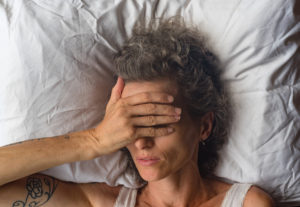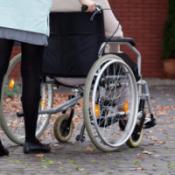 Alzheimer’s disease is a serious problem in the United States. According to the Alzheimer’s Association:
Alzheimer’s disease is a serious problem in the United States. According to the Alzheimer’s Association:
- Alzheimer’s is the sixth leading cause of death in the United States.
- One in three people over 65 dies with Alzheimer’s or another form of dementia.
- More than 16 million Americans provide unpaid care to someone with dementia.
- Caregivers provide an estimated 18.4 billion hours of care hours, valued at $323 billion annually.
Caring for someone with dementia can be stressful and exhausting. According to a new study published in Perspectives in Psychiatric Care, most people caring for a loved one with dementia don’t get enough sleep. Most awake frequently and sleep less than six hours each night.
The researchers suggest the caregivers’ sleep issues may stem in part from their loved ones’ sleep patterns. Many people with dementia wake frequently or wander at night. These disturbances may interrupt the caregivers’ own sleep.
Dementia Caregivers: Chronically Unrested
The study analyzed the sleep habits of 43 people. Each participant was a caregiver to a family member with dementia. They were all over the age of 50 and lived in western New York.
Caregivers completed a sleep diary for themselves and their care recipient. They also completed self-assessments of depression, care burden, sleep quality, and sleep hygiene. For seven nights, they wore an actigraphy watch, which measured sleep time, nighttime waking, and sleep efficiency.
Around 92% of participants had poor sleep quality. Data from the watch showed they slept less than six hours per night. The National Sleep Foundation recommends seven to nine hours of sleep per night. In other words, many people caring for loved ones with dementia are severely sleep-deprived.
Inadequate sleep is linked to a host of health issues, including high blood pressure, diabetes, a weaker immune system, and heart disease. A sleep-deprived caregiver may be in danger of developing an illness that affects their ability to provide quality care.
The Link Between Dementia and Sleep
A handful of studies suggest inadequate sleep could be a risk factor for dementia. A 2015 study found beta-amyloid accumulates more rapidly and in higher numbers in people who consistently experience poor sleep. Beta-amyloid plaques are thought to be a primary culprit in dementia. Most people with dementia show signs of these plaques on brain scans.
However, the study did not find a causal link between sleep and beta-amyloid plaques. It is also possible that people with these plaque deposits have worse quality sleep, rather than poor sleep causing the plaque build-up.
Although the causes of dementia are complex and not fully understood, researchers have identified genetic variants that increase the likelihood of developing dementia. People whose family members have dementia may be more likely to carry these genes. Thus, family caregivers may already face a higher risk of dementia. Inadequate sleep may multiply this risk.
Tips for Caregivers Seeking Better Sleep
Many study participants had poor sleep hygiene. Sleep hygiene is a collection of habits that can improve sleep quality and help people fall asleep more quickly. Participants with poor sleep hygiene had worse sleep and took an average of 40 minutes to fall asleep.
The National Sleep Foundation suggests the following tips to improve sleep hygiene:
- Avoid stimulants in the hours before bed. Stimulants include prescription drugs, caffeine, and nicotine, among others.
- Exercise during the day, not right before bed. Just 10 minutes of daily aerobic exercise can promote healthier sleep.
- Get plenty of natural sunlight during the day.
- Avoid daytime naps longer than 30 minutes. People who have difficulty falling asleep should not nap.
- Implement a relaxing bedtime routine. Avoid stressful conversations or activities before bed.
- Invest in a comfortable bed and pillow.
- Keep the room relatively cool.
- Keep the room quiet and dark. Turn off televisions and phones, and block out sources of natural light.
Caregiving and Mental Health
Caregivers face an increased risk of mental health issues, especially depression. A 2006 study found 40% to 70% of family caregivers have symptoms of depression. Poor sleep can intensify mental health issues.
Caregivers also face a wide range of emotional and financial pressures. They may feel guilty about being unable to do more for their loved one. Some may be overwhelmed by the financial constraints of caregiving. They could also feel resentful that other family members don’t help. These pressures can lead to relationship strain, career blocks, parenting issues, and a lack of self-care.
The right therapist can help caregivers find a healthy balance between their duties and their own needs. Therapy offers a safe space for caregivers to explore their emotions. Therapy can also help with implementing healthy lifestyle changes that support not just better sleep, but a better quality of life.
References:
- Caregiver statistics. (n.d.). Caregiver Action Network. Retrieved from http://caregiveraction.org/resources/caregiver-statistics
- Facts and figures. (n.d.). Alzheimer’s Association. Retrieved from https://www.alz.org/alzheimers-dementia/facts-figures
- Mander, B. A., Marks, S. M., Vogel, J. W., Rao, V., Lu, B., Saletin, J. M., . . . Walker, M. P. (2015). β-amyloid disrupts human NREM slow waves and related hippocampus-dependent memory consolidation. Nature Neuroscience, 18(7), 1051-1057. Retrieved from https://www.nature.com/articles/nn.4035
- National Sleep Foundation recommends new sleep times. (n.d.). National Sleep Foundation. Retrieved from https://sleepfoundation.org/press-release/national-sleep-foundation-recommends-new-sleep-times/page/0/1
- Nine out of 10 people caring for a family member with dementia don’t get enough sleep. (2018, August 01). ScienceDaily. Retrieved from https://www.sciencedaily.com/releases/2018/08/180801131549.htm
- Peng, H., Lorenz, R. A., & Chang, Y. (2018, July 4). Factors associated with sleep in family caregivers of individuals with dementia. Perspectives in Psychiatric Care. Retrieved from https://onlinelibrary.wiley.com/doi/abs/10.1111/ppc.12307
- Sleep hygiene. (n.d.). National Sleep Foundation. Retrieved from https://sleepfoundation.org/sleep-topics/sleep-hygiene
- Why lack of sleep is bad for your health. (2018, May 30). National Health Services. Retrieved from https://www.nhs.uk/live-well/sleep-and-tiredness/why-lack-of-sleep-is-bad-for-your-health
© Copyright 2018 GoodTherapy.org. All rights reserved.
The preceding article was solely written by the author named above. Any views and opinions expressed are not necessarily shared by GoodTherapy.org. Questions or concerns about the preceding article can be directed to the author or posted as a comment below.

 Women, Caregiving Roles, and the Body: What About Her Needs?
Women, Caregiving Roles, and the Body: What About Her Needs? World Alzheimer’s Month: The Costs of Caregiving for Dementia
World Alzheimer’s Month: The Costs of Caregiving for Dementia A Survival Guide for Caregivers with Depression and Anxiety
A Survival Guide for Caregivers with Depression and Anxiety